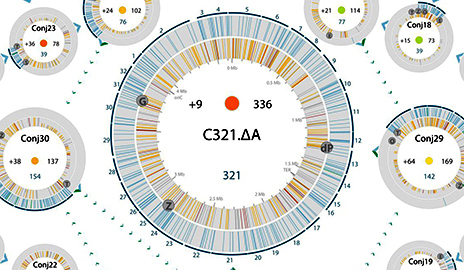First time ever: Researchers rewrite an entire bacterial genome and add a healthy twist
See on Scoop.it – Virology and Bioinformatics from Virology.ca
Scientists from Yale and Harvard have recoded the entire genome of an organism and improved a bacterium’s ability to resist viruses, a dramatic demonstration of the potential of rewriting an organism’s genetic code.
“This is the first time the genetic code has been fundamentally changed,” said Farren Isaacs, assistant professor of molecular, cellular, and developmental biology at Yale and co-senior author of the research published Oct. 18 in the journal Science. “Creating an organism with a new genetic code has allowed us to expand the scope of biological function in a number of powerful ways.”
The creation of a genomically recoded organism raises the possibility that researchers might be able to retool nature and create potent new forms of proteins to accomplish a myriad purposes — from combating disease to generating new classes of materials.
The research — headed by Isaacs and co-author George Church of Harvard Medical School — is a product of years of studies in the emerging field of synthetic biology, which seeks to re-design natural biological systems for useful purposes.
In this case, the researchers changed fundamental rules of biology.
Proteins, which are encoded by DNA’s instructional manual and are made up of 20 amino acids, carry out many important functional roles in the cell. Amino acids are encoded by the full set of 64 triplet combinations of the four nucleic acids that comprise the backbone of DNA. These triplets (sets of three nucleotides) are called codons and are the genetic alphabet of life.
Isaacs, Jesse Rinehart of Yale, and the Harvard researchers explored whether they could expand upon nature’s handywork by substituting different codons or letters throughout the genome and then reintroducing entirely new letters to create amino acids not found in nature. This work marks the first time that the genetic code has been completely changed across an organism’s genome.
In the new study, the researchers working with E. coli swapped a codon and eliminated its natural stop sign that terminates protein production. The new genome enabled the bacteria to resist viral infection by limiting production of natural proteins used by viruses to infect cells. Isaacs — working with Marc Lajoie of Harvard, Alexis Rovner of Yale, and colleagues — then converted the “stop” codon into one that encodes new amino acids and inserted it into the genome in a plug-and-play fashion.
The work now sets the stage to convert the recoded bacterium into a living foundry, capable of biomanufacturing new classes of “exotic” proteins and polymers. These new molecules could lay the foundation for a new generation of materials, nanostructures, therapeutics, and drug delivery vehicles, Isaacs said.
“Since the genetic code is universal, it raises the prospect of recoding genomes of other organisms,” Isaacs said. “This has tremendous implications in the biotechnology industry and could open entirely new avenues of research and applications.”
See on news.yale.edu
